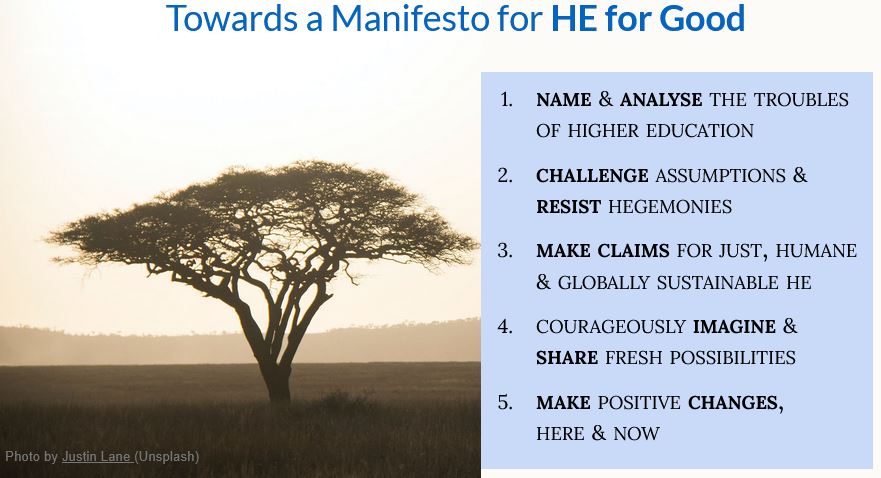 As are so many who are responding to the catastrophe that is Twitter, I am turning to blogging again. Just over two years ago, Catherine Cronin and I dreamt up an idea about imagining Higher Education For Good (#HEForGood). We were both disillusioned with HE and looking for ways to re-energise and find hope with our colleagues elsewhere. We put out a call for proposals which had an excellent response, culminating in a manuscript that is presently under review. We are both blown away when we look at what has been achieved in the last 18 months - 27 chapters by 74 authors in 18 countries. Including reviewers, people from 28 countries involved! We are having to be hold back our enthusiasm about sharing the stimulating and creative work that comprises the book. But we are able to - and have been - sharing the ideas that have crystallized from the work as well as from all the reading we have done. Catherine talked about these ideas at #OER23 in Scotland which she has blogged about here. I have been lucky recently to share these ideas in New Zealand. A big thank you to my generous hosts there: Kathryn MacCullum and Cheryl Brown from the University of Canterbury, Sean Sturm from Auckland University and Lucila Carvalho from Massey University. It was wonderful to actually be there physically, to engage in thoughtful conversations and to find how much the issues resonate across contexts. I am also chuffed that the recorded talks were used for teaching. While we can't yet describe the book in detail, from reflections, readings and the book chapters, Catherine and I can offer five tenets towards a Manifesto for Higher Education for Good. Tenet 1: Name and analyse the troubles of HE It very soon became clear to us that to look forward and reframe positive futures, it is essential to confront and stare into the darkness. This means (in summary) naming, understanding and analysing the central challenges of HE: neoliberalism both explicit and implicit; coloniality, manifested in so many ways; data extraction via myriad platforms; and multiple forms of inequality & exclusion. Tenet 2: Challenge assumptions and resist hegemonies The second tenet is that of resistance and the challenging of assumptions. This is about re-centering people and perspectives by bringing in voices and views from the margins. It is about border-crossings of several kinds including geographic, disciplinary, status and genre. And it is about resisting and and challenging dominant narratives of knowledge, technology, economics, society and culture. Tenet 3: Make claims for a just, humane and globally sustainable HE The third tenet is to stake and make firm claims for just, humane and globally sustainable HE. This means claiming and growing theories for good. It means making explicit claims for the values of justice and sustainability in a humane HE sector both now and in the future. Tenet 4: Courageously imagine and share fresh possibilities. The fourth tenet is to courageously imagine and share fresh possibilities. Here we call for the power and value of imagination in all forms, formats, methods, genres and approaches. Tenet 5: Make positive changes here and now And the fifth tenet is to make positive changes here and now, no matter what the size of them because change is contagious and because small streams become large rivers. Making change now can repair the past and create coalitions for the future. It is wonderful, and energising, to have started talking, sharing and engaging with colleagues and friends in various countries about ways of making hope and creating change. Looking forward to elaborating on these ideas, and on the fantastic chapters in the book as soon as feasibly possible! * Check here regularly for updates on #HEForGood, including links to presentations.
1 Comment
N Barney Pityana
20/4/2023 02:54:35 am
This conversation is long overdue. What the Manifesto misses for now is the interdependence between the university and the cultures that shape society for good or ill. That healthy and mutually reinforcing balance for good has broken down in South Africa.
Reply
Your comment will be posted after it is approved.
Leave a Reply. |
AuthorI am a professor at the University of Cape Town in South Africa, interested in the digitally-mediated changes in society and specifically in higher education, largely through an inequality lens Archives
April 2024
Categories |


 RSS Feed
RSS Feed
